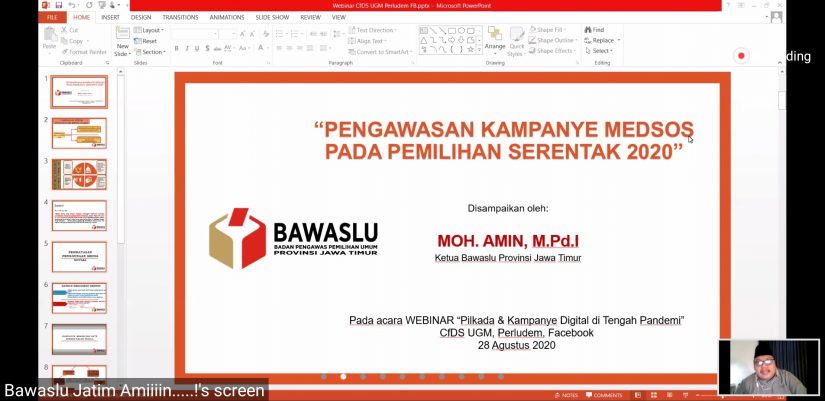
Yogyakarta, August 28th 2020—Center for Digital Society UGM cooperated with Association for Elections and Democracy (Perkumpulan untuk Pemilu dan Demokrasi/Perludem) and Facebook Indonesia held an online webinar. It was called ‘Regional Head Elections and Digital Campaign in the Middle of a Pandemic’, this webinar presented four speakers from various expertises, from the organizer itself—Facebook Indonesia and Perludem—, to General Elections Commission of Republic of Indonesia (KPU RI) and Election Supervisory Agency (Bawaslu). The representation of CfDS—Faiz Rahman, Adjunct Researcher of CfDS—also joined in this discussion and was moderated this discussion.
The explanation in this discussion was delivered by Ruben Hattari, the Head of Public Policy of Facebook Indonesia, who delivered his opening speech. Faiz Rahman, the moderator, also explained some prefaces before introducing and welcoming the speakers to start speaking. Faiz said that the implementation of regional head elections in the midst of a pandemic like now faces two challenges at once, challenges in real life—how regional head elections should adjust to the health protocols, and in the cyber world—how online media have a profound influence on the dynamics of election administration.
In responding to those challenges, KPU made several changes in the rules, especially related to nominations and campaigns—that’s what I Dewa Kade Wiarsa Raka Sandi, Commissioner of KPU RI, conveyed. However, Raka said that until now, there were still several things that needed to be studied further without abandoning the principles of justice and equality. Actually, the campaign method being implemented is still the same, but currently its implementation is adjusted to the existing protocol and conditions. Raka’s explanation focused a lot on the use of online media for campaigns which are currently being studied intensively by the KPU. With online media campaigns that can be accessed by all people, the public can take a role in monitoring.
Apart from the community, of course Bawaslu will also supervise the running of campaigns in online media, especially social media, during the elections in the midst of this pandemic. According to what Moh. Amin, the Head of Bawaslu of East Java Province, had said that Bawaslu supervises two types of social media accounts, they are accounts registered to the KPU and other accounts which are not registered to the KPU. Social media, said Amin, is an effective communication tool in influencing public opinion by becoming a space for disseminating opinions, discourses, and organizing the masses. Especially in this current pandemic, social media is widely used to fulfill human needs. For this reason, social media is used as a means of campaigning. However, the presence of social media in the campaign also has the potential to become a destructive propaganda tool. Because of that, monitoring of the use of social media for campaigns by various parties is needed, including by Bawaslu.
Not only by the government and society, but even a company can participate in supervising the regional head elections. With the hope of supporting an effective digital government, Facebook Indonesia also took part in supervising the implementation of the regional elections through various steps. In implementing the online campaign on the Facebook platform, a representative from Facebook Indonesia, Noudhy Valdryno, conveyed several efforts made by his party as a form of supervision, from eliminating fake accounts and spreading hoax news, to making campaign advertisements more transparent. Apart from using the platform, Facebook Indonesia also provides recommendations for election and regional election regulatory policies that have been prepared in collaboration with CfDS.
In the middle of this pandemic, digital activity of regional head elections has increased and digital campaigns are a necessity, that’s what Titi Anggraini, representative from Perludem, said. However, Titi emphasized that this online campaign can not completely replace conventional campaigns. Online campaigns also need to be balanced with digital literacy to avoid propaganda as explained by Amin. Although the KPU has formulated rules related to this digital campaign, Titi explained that in executing its compliance, these regulations can face big challenges. For this reason, a campaign code of conduct on social media is needed, as well as a clear and easy mechanism for reporting campaign violations.
Titi became the closing speaker for this online webinar. After the question and answer session, the moderator also invited the speakers to deliver a closing statement. Ended with a group photo, this webinar officially ended at 11.45 a.m.
